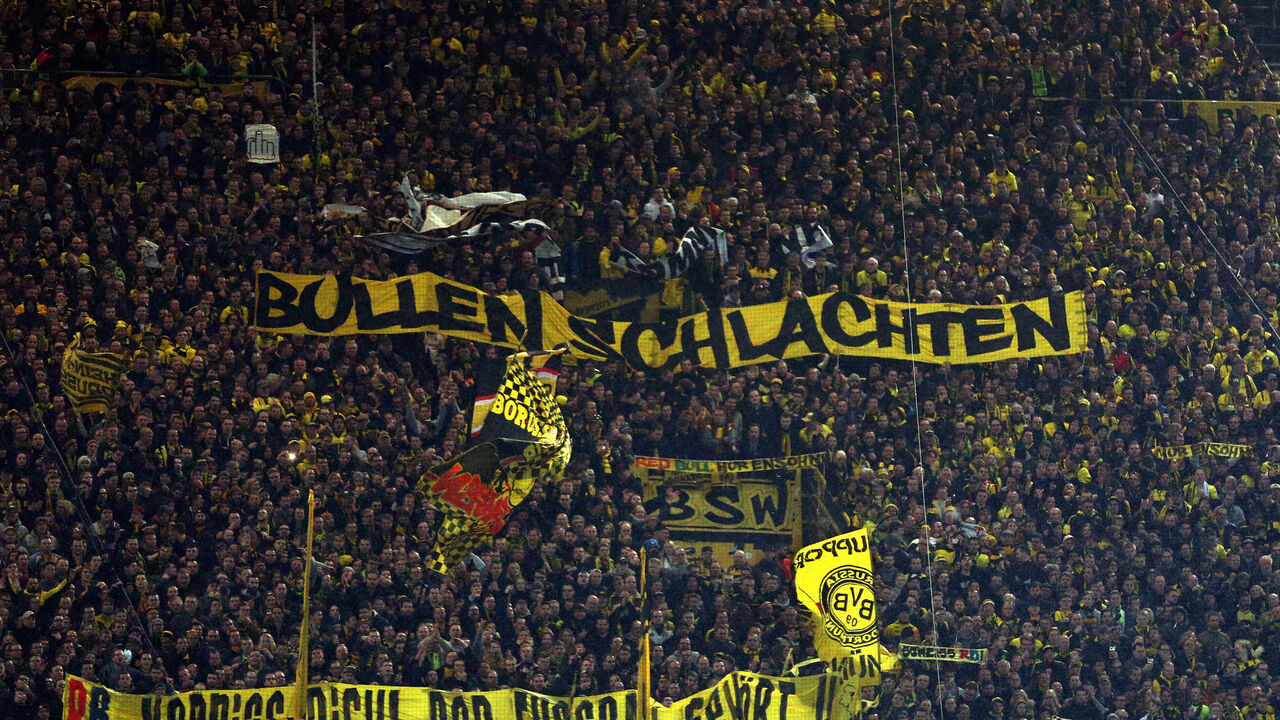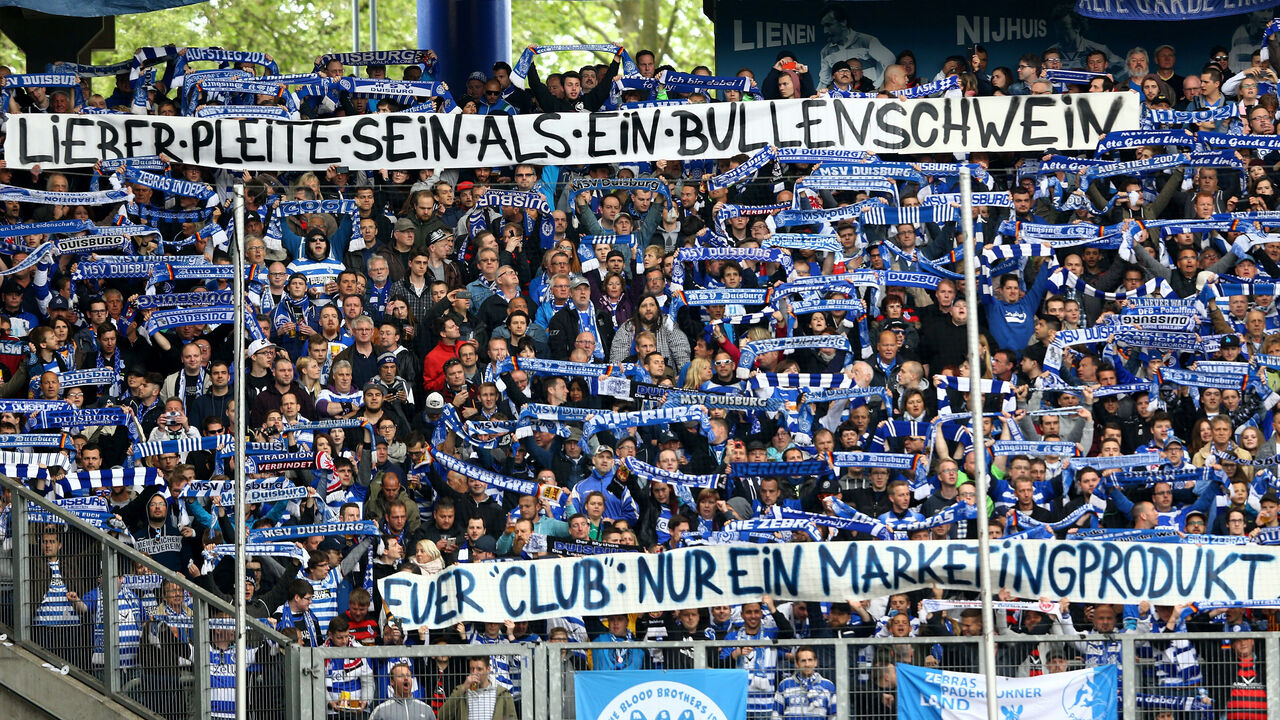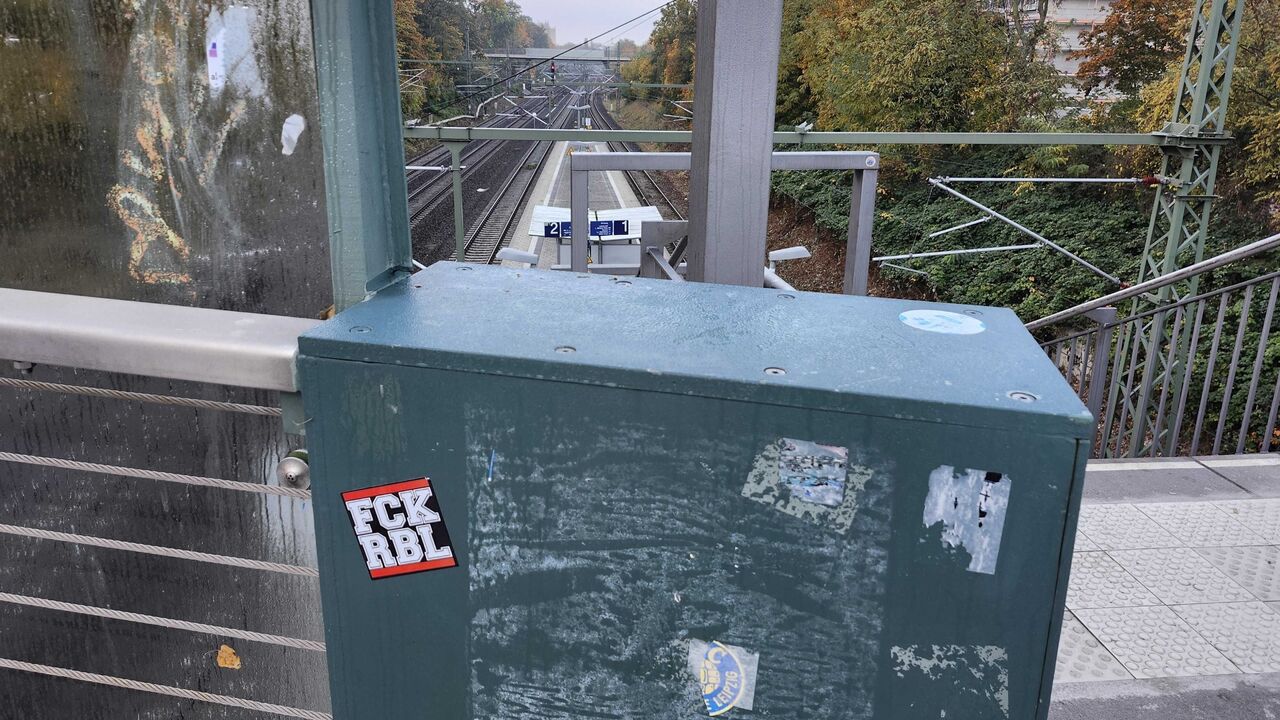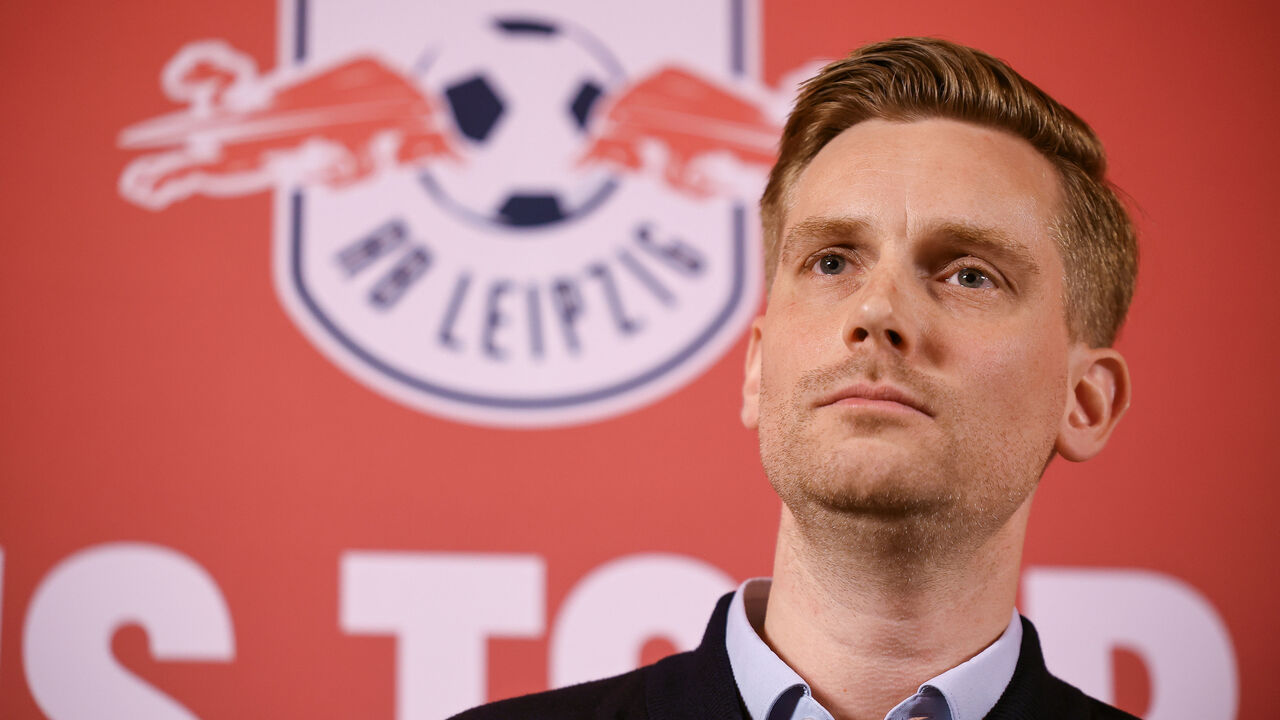Germany hates RB Leipzig. Is the hostility deserved?
The hate was inescapable. RB Leipzig's rise to become a Bundesliga title challenger started with a trip to Jena in 2009, but the obscure setting didn't protect them from what would become a constant theme for the next 15 years. Throughout the journey of over 100 kilometers, there were regular warnings to turn back.
"The bridges were covered with paint and with some signs: 'You are not allowed to play football in Jena,'" Stefan Krause, head of newspaper Bild's sports coverage in eastern Germany, told theScore.
Little-known Carl Zeiss Jena were in the third division - but they weren't RB Leipzig's opponents that day. The angry demonstrations instead dominated the newly established team's meeting with Carl Zeiss Jena's reserve side down in the fifth tier.
"There were a lot of very angry fans. In the game, there were some fans who spat beer at the players," he said.
One banner implored fans to "Boycott and fight Red Bull Leipzig." Cups were flung from the stands. Krause remembers the squad skipping post-match showers and rushing onto the bus to escape the hostility. They traveled back to Leipzig "with police cars in front and behind."
Leipzig anticipated more spite during Saturday's 2-1 defeat at Borussia Dortmund. BVB supporters have arguably provided the most vociferous opposition against Red Bull's presence in German soccer. Anti-RB banners have dominated the Westfalenstadion's iconic "Yellow Wall" during Leipzig matches, but the fans' protests have also turned violent.

The most shameful episode occurred in 2017 when RB Leipzig first journeyed to Borussia Dortmund's home. Some visiting supporters were targeted with bottles and stones. Punches and kicks were thrown. "Any person who could be identified as a Leipzig fan, regardless of whether they were small children, women, or families" was a target, Dortmund police said.
Borussia Dortmund denounced the scenes, and the wide condemnation seemed to stem the flow of similarly aggressive acts in the matches that followed. However, the intensity increased before this weekend's latest installment of the teams' rivalry. Jurgen Klopp guided Dortmund to back-to-back Bundesliga titles in 2011 and 2012, forging a powerful bond with the supporters during his seven-year tenure, but he's faced a fierce backlash from some of the club's fans since he agreed in October to take over Red Bull's global soccer operations beginning in the new year.
"It felt like a betrayal," said Gregor Ryl, co-host of popular German football podcast "Copa TS."
"It was a big shock that he went to the bad side," he added.
Ryl, a Dortmund fan born and raised near Leipzig, says Klopp has lost his legendary status in the Ruhr Valley through his association with Red Bull. He says even winning a World Cup with Germany wouldn't fix the damage Klopp's caused to his reputation among Dortmund supporters. The self-described "Normal One" has backed a project that's widely viewed as a scourge on German football.
Killing 'vermin'
The main source of Ryl's dislike of RB Leipzig is how they circumvent one of German football's most cherished and unique elements: The 50+1 rule.
The system states that fans with memberships should own 50% of the club plus hold an extra vote, thereby giving them final say over how the club is run. It means supporters can overrule an investment group that doesn't look after the best interests of the club.
Red Bull maintains control over RB Leipzig's day-to-day operations by having the power to approve or deny someone the opportunity to invest and become a member - and to say it's a selective process is an understatement. There are just 23 RB Leipzig members with voting rights. Bayern Munich, by contrast, have over 360,000.
"German clubs live through what members want to create in the club. That's not possible within RB Leipzig," Ryl said.

The "RB" stands for RasenBallsport, a clunky and clumsy phrase meaning "lawn ball sport." Simply referencing Red Bull's initials instead of using them outright was the next-best option after the league turned down the company's efforts to rename fifth-tier SSV Markranstadt - who it took over in 2009 - "Red Bull Leipzig." But a company featuring in a German club's name isn't new. Pharmaceutical giant Bayer has always preceded Leverkusen in the club's name since it was established as a works team in 1904.
Other huge companies and investors have proudly pumped money into the German game. Volkswagen and Wolfsburg are inextricably linked. Software billionaire Dietmar Hopp took Hoffenheim, his village team that had never climbed higher than the fifth tier of German soccer, from the ninth division to the Champions League. Like RB Leipzig, it's a rise fueled by finance and lacking in romance, but perhaps unlike RB Leipzig, Hoffenheim would struggle to remain at their current level without their benefactor's spending.
But there's one key element that differentiates the cases of Leverkusen, Wolfsburg, and Hoffenheim from the Austrian energy drink's flagship club, according to Heidelberg University research associate Dr. Pavel Brunssen.
"These businesses are seen as local and traditional and so not as evil as Red Bull and Leipzig, which is seen as this global business which only came into the sport to make profits," Brunssen told theScore. "(Rival supporters) have this split of good capitalism and bad capitalism."
The hatred of RB Leipzig unites the rest of Germany. Traditional clubs -traditionsverein - and long-standing values in soccer are a huge point of pride in the country, and Brunssen says RB Leipzig and their fans will never be part of that community.
"They see RB Leipzig as an intruder, as an outsider, as an alien, as a club that is not really a club but a plastic club that is artificial, that is global, that does not belong into the sport of the German people," Brunssen explains.

As part of his research, Brunssen explored the words used in the 2016 rap song "Anti RB," which was spearheaded by Dortmund fan M.I.K.I but featured numerous artists.
In addition to some objectionable clips in the music video, Brunssen found the song revealed how language about RB Leipzig, and not just matchday violence, can be deeply problematic.
"He equates RB Leipzig with rats or other kinds of vermin, and how he wants to be the person who kills them," Brunssen said of one of the rapper's parts. "So he has these metaphors that have a long history, of course, in antisemitism."
Exposing hypocrisy
Bulls flex muscles and flare their nostrils on the walls of RB Leipzig's training complex as academy players test their acceleration on the indoor running track and first-team stars walk down the tunnel to six immaculate practice pitches. The atmosphere is friendly and relaxed. Fridges are everywhere, stocked with a kaleidoscope of Red Bull flavors.
Johann Plenge cracked a Red Bull and sat at the head of the table in one of the facility's meeting rooms.
"Our club is based in the city center," the RB Leipzig managing director told theScore. "It was a decision in 2017 not to build a new stadium somewhere next to the autobahn with perfect parking lots and great infrastructure to easily go to the stadium. We took the decision to buy the Red Bull Arena because it's in the heart of Leipzig."
He added: "Our coach, our players, and everybody here from the club is really in touch with the people here in Leipzig."
RB Leipzig's local presence, and the achievements of two German Cups and a pair of second-place Bundesliga finishes so early in the club's history, seems to be paying off. Plenge says RB Leipzig have overtaken Borussia Dortmund as the most popular team in Mitte Deutschland - the central part of Germany with no big clubs - and now stand sixth or seventh in Bundesliga popularity.
Bild journalist Krause says the aggression toward RB Leipzig isn't as intense as it was five to seven years ago. But the resentment still simmers through the German football pyramid. This past summer, RB Leipzig had one friendly match against fourth-tier FC Rot-Weiss Erfurt canceled after protests from fans. Another game, against Erzgebirge Aue, was played with no supporters, and fans of the third-division side boycotted their team's next two matches to express their disgust with the fixture.
A growing factor in the Dortmund rivalry is the most simplistic of all: RB Leipzig are a threat. Currently on 20 points apiece with Bayern at the top of the Bundesliga, Leipzig are challenging Dortmund's position as the second-most powerful side in the country.

"It's not our objective to be the most-liked club, but for people to have an opinion on us," Plenge said. "Bayern Munich, for example, are the most-liked club in the Bundesliga, but they are also the most disliked club, because you either like them or you don't like them. But you have an opinion on them, right?"
Perhaps RB Leipzig is exposing an uncomfortable truth for Germany. They aren't ashamed of their corporate identity: Directly borrowing from Red Bull's slogan, Manuel Baum, who heads the youth academy in Leipzig, told theScore that the club was "giving wings" to young players. Meanwhile, other Bundesliga clubs are also fully invested in modern soccer's brash capitalism, and in some cases in a shadier, more distasteful manner than the much-maligned RB Leipzig. But many fans in Germany seem to be in denial while they obsess over Red Bull's involvement at the peak of the game.
Borussia Dortmund recently boosted their coffers with a deeply controversial commercial deal with Dusseldorf-based weapons manufacturer Rheinmetall. Affluent Bayern Munich won the league 11 times in a row until Bayer Leverkusen snapped their hegemony. Hoffenheim are competing in their 17th straight top-flight campaign, and Wolfsburg boast the fourth-longest spell in the league at 28 seasons. Schalke, one of the nation's greatest football institutions, have fallen to the lower reaches of the second tier due to financial problems that include the abrupt end of a 15-year partnership with Gazprom, a company majority-owned by the Russian state.
This is simply the money-mad environment of modern professional football. Much to the dismay of most German fans, the country's most outwardly corporate club, RB Leipzig, happens to be really good at operating within it.
HEADLINES
- Boras criticizes Astros as Bregman talks stall: 'Running from leadership'
- Mahomes: Clinching AFC's No. 1 seed 'like winning a playoff game'
- Texans' Stroud: Ravens loss among 'worst games in my whole career'
- 2024 in review: 10 athletes who defined the year
- Durant, Beal score 27 points each, Suns beat Nuggets